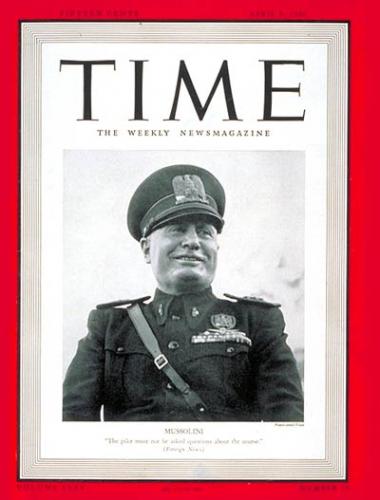America loves a good fascist
LISA COLLETTA
|
15 February 2016

America's Republican canditate Donald Trump, accused of imitating Mussolini.
ROME -- A little over a year ago there was an exhibit of Saturday Evening Post covers by Norman Rockwell at Rome’s Museum Foundation. Though I am not an enormous fan of Rockwell, I went to see it happily enough, expecting to experience a pleasant feeling of nostalgia. Living in Rome, I sometimes miss certain aspects of American culture; our “straight-fowardness,” the way we unselfconsciously smile at strangers on the street, and the way we, basically, adhere to the fundamental fairness of waiting on line. I have a soft spot for Rockwell’s work because it reflects much what is truly good about the American ethos while his trenchant eye also ironically reveals what is hypocritical about it.
What I did not expect to find, though, was a series of articles from the late twenties penned by Benito Mussolini. There, in the most American of magazines and nestled between the likes of F. Scott Fitzgerald and P.G. Wodehouse, Mussolini’s name seemed wildly out of place. Historians of the era are likely aware that Mussolini was a frequent contributor to the magazine (or at least his ghost writer, the former U.S. ambassador Richard Washburn Child, was), but I am embarrassed to admit that I was ignorant of the fact, as were nearly all of my expat friends.
It turns out that a good many Americans were quite enamored of Mussolini, and despite the awkward detail of his being a dictator, he was actually quite popular in the American press throughout the twenties and even into the thirties. His popularity can be attributed to many factors that include a deeply rooted romanticized view of Italy as being primitive and decadent, perpetuated by the writing of Grand Tourists like Henry James and Edith Wharton, as well as American fears about unrestricted immigration and of Bolshevik rebellion.
But the undeniable fact is that Mussolini made good press. He was always doing outrageous things like riding his horse bare-chested in the Villa Borghese and strutting around in gym outfits and swimming suits. He even had himself portrayed as a peasant gathering sheaves of wheat right behind the Virgin Mary in the massive mosaic for the church in the rationalist seaside town of Sabaudia.
Not exactly Trump Towers, but you see where this is going.
Ted Koppel and others have already compared Donald Trump to Mussolini, and whenever a bully with a penchant for flamboyance arrives on the scene, it is the go-to comparison. Italians themselves said Trump was an imitation of Berlusconi, and Berlusconi was an imitation of Mussolini.
The comparison of blowhards to Fascist dictators is natural. What is more troubling is their continual appeal to democratic populations, and the popular press’s somewhat feckless reaction to dangerous men with unbearable market appeal. In terms of ratings, viewers, and marketing, the press could not afford to ignore Trump. But no one really seemed to know how to hold him accountable for his actions or words. Now it is too late, Trump is both spectacle and legitimate news. And Ted Cruz and other Republicans are now trying to out-Mussolini him.
Like Mussolini, Trump’s willingness to be shocking makes him look strong and honest—forthright-- at the same time it makes rational discourse and thoughtful engagement with difficult problems look weak and decadent.
Though many American newspapers and magazines were wary of Fascism in the twenties, most of the popular press soft pedaled Mussolini’s seizure of power and praised him for restoring order, virility, and moral integrity to a corrupt and dissolute culture. Time magazine featured him on the cover no less than eight times between 1923 and 1943. Mussolini never made “Man of the Year,” despite the selection of Hitler once and Stalin twice. Fortune abandoned all pretext of journalist impartiality in 1934 and published an entire issue on the virtues of the “Corporate State,” suggesting that it is clearly much better for business if industry sets policy, rather relying on the chaos of democracy.
However, it was the Saturday Evening Post, the bastion of middle-class America, that had the most influence on average readers. In 1930, the weekly had nearly three million subscribers, and under the direction of the unabashedly pro-Fascist Cyrus Curtis each one of them could read about Mussolini as a political savior who turned back red terror, an economic genius who had created a fiscal revolution, and a self-made man whose march on Rome was a victory of virtue over vice. Mussolini was no weak socialist, and it took his self-made manhood to return Italy to its glory days. After his famous interview with Mussolini, even Will Rogers quipped, “Dictator form of government is the greatest form of government; that is, if you have the right Dictator.”
I am not too sure that most Americans would have disagreed with Will Rogers in 1926, not knowing what Fascism and dictators would do to the world. Even now, having lived through that history, many Americans would still not disagree with him. Trump is gaining in the polls despite his increasingly inflammatory racist and sexist language and his urging crowds at his rallies to gang up on dissenters.
The sad fact is, America likes a good Fascist--the ones who make the trains run on time, have a firm hand, appeal to national pride, call out the excesses of entitlement culture, and speak for middle-class common sense and good business practices: the values seemingly portrayed on the covers of The Saturday Evening Post.
But if you look carefully at a Norman Rockwell cover, you can see something troubling. There are puppies and grandpas and soldiers and kid sisters, but there is an irony in the way they are represented, as if Rockwell wanted draw attention to the mythmaking he was participating in. He seemed somehow aware that he was illustrating an American fable. In this sense, Mussolini’s presence in the pages of The Saturday Evening Post makes perfect sense. His myth appealed to a good many of the Post’s average American readers, in many of the same ways that Trump’s does.
It is as if there is a deep seated suspicion at the heart of democracies that bubbles up every few decades, giving voice to the idea that dedication to democratic principles, to the messy process of democracy itself, is weak and corrupt. Bullies, tyrants, and billionaires become working-class heroes. They run roughshod over democratic values and we praise them for it.
Like Mussolini’s presence in The Saturday Evening Post, Trump’s rise points to something dark and profoundly undemocratic in American culture.
lc-ft

Mussolini was featured on the cover of Time magazine eight times in 20 years.


